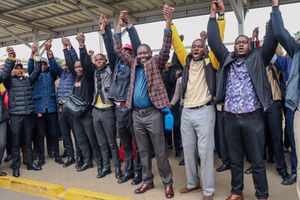Mali a lesson to despots

A soldier stands next to supporters of Mali's National Committee for the Salvation of the People on September 5, 2020 in Bamako.
What you need to know:
- Arbitrary powers of some presidents, and lack of accountability and transparency, have suppressed democracy.
- Some leaders are a stumbling block to democracy and merchants of a misdemeanor.
The recent detention and release of Mali’s President Boubacar Keita and senior members of his administration, including Prime Minister Boubou Cisse, following his forced resignation is a wake-up call to African dictators.
Mahmoud Dicko, an influential personality in Malian politics, had led thousands of protesters in agitating for Mr Keita’s resignation since June, hence the June 5 Movement.
The regime was accused of an oligarchic, plutocratic system of predation that condoned grafts and impunity. Efforts by Ecowas mediator Goodluck Jonathan, a former Nigerian president, to halt widespread demonstrations failed.
Rogue regime
Paradoxically, as leaders around the world strongly condemned the August 18 mutiny by the junta, Malians were celebrating the turn of events. Over the years, they have lived under the heel of an increasingly dictatorial and rogue regime, including the eight-years of Jihadist conflict.
Dr Martin Luther King, Jr said: “We are prone to judge success by the index of our salaries or the size of our automobiles, rather than the quality of our service and relationship to humanity.”
While political leaders’ primary the objective should be the electorates, most political leaders in Africa have the propensity to go to the extreme on material possession.
Political competition
Other than the political competition which is normal during the electioneering period, the obsession with possession has made many political leaders give preference to material wealth instead of service delivery to the electorate.
While most African countries have adopted multiparty democracy, political pluralism is a foreign language to many leaders, who often intimidate and harass the opposition to destabilise it. Arbitrary powers of some presidents, and lack of accountability and transparency, have suppressed democracy.
Some leaders are a stumbling block to democracy and merchants of a misdemeanor.





